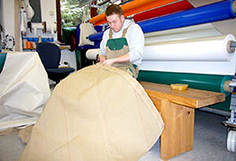What would a circus be without a circus tent, the Oktoberfest without beer tents or an open-air event without a functional canopy over the stage? Sophisticated sail technology makes it possible to win a regatta and awnings protect us from too much sun. Products made by sail makers and technicians in heavy-duty fabric goods manufacturing are everywhere.
Working together with the social partners and experts, the Federal Institute for Vocational Education and Training (BIBB) recently updated the training regulations for both occupations on behalf of the German government. The new regulations will go into force on 1 August 2010.
The vocational profile for the occupation Sail Maker dates back to the year 1963. It was completely revised and brought into line with the latest industry standards. Similarly, the work on updating the 13-year-old training regulations for the occupation Technician in Heavy-Duty Fabric Goods Manufacturing ensured that new developments in this sector were taken into account. Both of these 'training occupations' (which require completion of formal vocational training) offer good prospects because well-trained skilled workers are in strong demand.
Sail making is a traditional craft whereas the work done by technicians in heavy-duty fabric goods manufacturing involves industrial manufacturing processes. Both occupations revolve around the production of so-called technical textiles such as tents, tarpaulins and awnings. Although there are overlaps in the content of the training for the two occupations, they have their own separate training regulations and framework curricula.
As is the general practice in occupations with small numbers of trainees nationwide, the training for the occupations Sale Maker and Technician in Heavy-Duty Fabric Goods Manufacturing is usually offered at one location in the country: Ongoing sale makers undergo training in Lübeck-Travemünde, future Technicians in Heavy-Duty Fabric Goods Manufacturing receive their training in Cologne.
A new concept was developed for the organisation and structure of the training regulations, training content and examination requirements for the occupation Sale Maker. The focus of the three-year training programme is on the manufacture of sails for various types of boats and the manufacture and installation of tarpaulins, tents and awnings. Trainees must, most importantly, cut to size and sew sails.
However the practical work "on board" such as fastening sails and work on masts and riggings plus knowledge about conduct when on board a vessel and the prevention of water pollution are indispensible elements of the training for this occupation. Sail makers maintain intensive contact with their customers and also offer corresponding services.
The focus of the training for the occupation Technician in Heavy-Duty Fabric Goods Manufacturing is on sewing, welding and bonding techniques for manufacturing off-the-peg technical goods. Examples of such products include awnings, tents, tarpaulins and canopies for protection against the sun and elements, transport technology and structural engineering, and for custom-made products such as oil barriers, advertising tarps and the unique roof structure of the football stadium in Munich.
Prepared for wind and weather

Source: News release of the Federal Insitute for Vocational Education and Training (BIBB), revised by iMOVE, May 2010